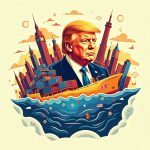In a world where political proposals can range from compellingly audacious to downright befuddling, the idea of replacing all income taxes with an import tariff certainly shakes up the status quo. It's a notion that whisks us back to a time when tariffs were not just a tool of economic regulation but a fundamental revenue source for the government. Today, the Zeihan on Geopolitics channel tackles this tantalizing proposition. As Peter Zeihan notes from his windy corner of Colorado, there's been a buzz in Washington about this very idea. Let's untangle this economically daring scheme and what it could mean for the future of America's fiscal policies.
The tale begins over a century ago when the United States had simpler means of balancing its books. Back then, tariffs were the order of the day, a time when the economy wasn't entangled in the complex web of today's global supply chains. Fast forward to the present, and the scenario couldn't be more different. The United States now imports approximately $4.1 to $4.2 trillion worth of goods and services, three-quarters of which are tangible goods. Meanwhile, the income tax system, the backbone of federal revenue streams for many decades, generates about $2.6 to $2.7 trillion annually. To replace the income tax with tariffs would mean imposing a hefty 50% to 65% surcharge on everything, which is hardly a modest tweak to the system.
Now, imagine this: every electronic gadget you depend on daily, the gasoline that powers your car, even the fresh produce on your dinner table—each could see a significant price increase. Welcome to Fortress America 2.0, where trading partners like Canada, China, and various East Asian countries might brace for impact as this tariff tsunami crashes upon their shores.
In this visionary yet controversial proposal, Peter Zeihan brings a crucial point to the forefront—the social welfare state juxtaposed against the economic logic of the 1800s. Nowadays, the United States government juggles budgetary behemoths like Medicare, Medicaid, Social Security, and defense. The idea of scrapping these for a tariff substitute would require not merely a legislative overhaul but a seismic political shift that the nation might be far from ready to embrace.
The concept of tariffs taking a front seat in fiscal policy isn't just a simple gimmick for economics lectures or a whimsical throwback to the days of yore. It challenges us to visualize a paradigm shift in how the government funds itself, prompting reflections on our dependence on global imports. Are we as a society willing to endure the economic aftershocks that this radical revamp of policy would entail?
To contextualize this proposition: Picture the economy as a busily buzzing bee, tireless in its ceaseless toil. What if we ripped away its access to the diverse flora—the international trade systems—that currently nourish it? Would the buzz of industry wither into silence? Or would it adapt to the new gardens of domestic production?
Let's not kid ourselves—repealing the income tax and leaning entirely on tariffs isn't about choosing simplicity over complexity. It's about questioning the fundamental balance between sovereignty and globalization. The potential fallout isn't only a matter of national economics but a profound cultural statement. Could America, the bastion of economic freedom, ever willingly retreat to the confines of isolation in pursuit of fiscal independence?
Before we find ourselves swept away by such notions, it's vital to consider the broader conversation this stirs. What does complete self-sufficiency really mean? Could such ideals exist today, or are they reminiscent of a bygone era that no longer aligns with our interwoven economies and societies?
This radical vision provokes questions, stirs emotions, and perhaps awakens dormant contemplations of national identity and destiny. Could tariffs replace income taxes, providing the proverbial economic utopia, or would they plunge us into a tumultuous sea of unintended consequences?
Join us in this thought-provoking exploration. Can we redefine the way we contribute to and benefit from our economy? How would a renewed focus on tariffs reshape everyday American lives? Dive into the debate. Share your thoughts below, and become part of the iNthacity community, that "Shining City on the Web". Subscribe now to stay in the know, as we explore how big ideas like this shape our world today and tomorrow.
Wait! There's more...check out our fascinating short story that continues the journey: Abyss of Trust
Disclaimer: This article may contain affiliate links. If you click on these links and make a purchase, we may receive a commission at no additional cost to you. Our recommendations and reviews are always independent and objective, aiming to provide you with the best information and resources.
Get Exclusive Stories, Photos, Art & Offers - Subscribe Today!

























Post Comment
You must be logged in to post a comment.